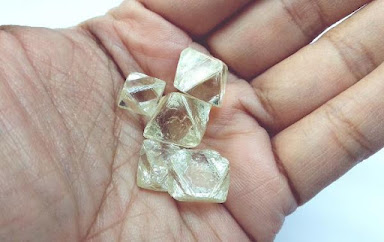India sojourns rough Import!
Endeavours to stabilize polished prices
India being the global leader in diamonds, it produces 14 out of 15 diamonds set in jewellery worldwide and polishes one billion stones each year. In FY 2019, India’s major export markets for cut & polished diamonds were USA ($6,960.09 million), Hong Kong ($6,381.97 million), Middle East ($2113.63 million), Europe ($1,534.50 million).
Although the year 2020 is reminiscent of the recession period of 2008-09 when the Indian diamond industry collectively and voluntarily decided to halt imports of rough for a month or so to ease pressure on the overburdened pipeline.
This time though, multiple calls were taken month on month starting in April, to review the spread of the pandemic and the danger it posed to lives, before taking a call to restart the units, which had come to a grinding halt in March following the nationwide lockdown.
In
a true spirit of solidarity, the industry, led by the Gem & Jewellery
Export Promotion Council (GJEPC) along with other important bodies like the
Bharat Diamond Bourse, Surat Diamond Bourse, Surat Diamond Association, and the
Mumbai Diamond Merchants Association reached a consensus to request voluntary
suspension of rough import.
As demand precipitously dried up in every single market, manufacturers feared that even a reduction of diamond production would not be enough to stop a loss of value on inventory then estimated at $6-7 billion. It was felt that manufacturing polished goods should be a reflection of true consumer demand and the Indian industry demonstrated the maturity to manage its own demand-supply mechanism.
India’s suspension of rough imports mirrored the responsible actions of the two biggest miners, Alrosa and De Beers, who allowed their long-term clients to defer buying and avoid excessive stocking, thus giving maximum flexibility to customers. By taking a demand-driven approach, the miners provided confidence to the midstream. Even at its August sale, Alrosa has allowed 100% deferrals to clients in a bid to avoid putting additional pressure on the market.
“Commodities across the world, including oil, have fallen but diamond prices have been stable, this was the result of a conscious decision taken by the Indian diamond companies to cut down rough imports so that businesses can reduce their inventories, lower debt, and manage cash flow,” notes Colin Shah, Chairman- GJEPC.
“The
Indian industry appreciates the actions of De Beers and Alrosa to help their clients.
This served the collective good of the pipeline, helped India clear some
inventory, improved cash positions, gave retailers a sign that diamond prices
would hold, and kept diamond prices from going into free fall,” says Sanjay
Shah, Convener, Diamond Panel Committee, GJEPC.
The self-imposed disciplinary approach which the Indian diamond industry has taken, has borne fruit. As markets across the world are opening up, demand is reviving gradually, thus allowing all to operate into a new normal.
The Indian cut and polished diamond exports, which are down by 50%, have seen an improvement in demand for certain goods; but there are shortages in some select categories. Still, a good part of the inventory is not moving, and the trade should be cautious and take steps to reduce inventory further.
The outlook for 2020 depends on a number of factors that are external to the industry and could possibly delay market recovery. The midstream is expected to restock in 2021, provided end-consumer demand continues to recover.
However, one should expect the midstream to consolidate with smaller players leaving the market. Despite B2B sales picking up from September to January, the Christmas wholesale business is expected to be down by 30-40%. The GJEPC is monitoring the situation closely and will base all future decisions on pipeline demand, ensuring a win-win for all stakeholders.






Comments
Post a Comment